Note that this is a crosspost from our blog. We're posting it here because the EA community has been instrumental from the very beginning to our organization, so perhaps in some way we're hoping to make you all proud of the work that some of your own have done.
As always, all questions—however candid—are welcome!
Message from our Cofounders
In our previous year-in-review post, we wrote about how we had made significant progress in developing our interventions, and how because of that progress we were finally beginning to see specific avenues forward to scale an intervention in India to help hundreds of millions of fishes. We are now one year later, and though it was a year of significant progress in many ways, that earlier analysis now seems premature.
We began 2023 with ambitious scaling goals to add 150 farmers to our farmer program, and to help an additional 1 million fishes. Unfortunately, largely due to increasingly-apparent limitations in our interventions, we fell short of these goals. These limitations also inspired two strategic changes over the course of the year, which, while needed, created instability that at times was challenging for our team. All of these things made 2023 feel like a challenging year for our programming, and for our organization more broadly.
However, with our last strategic change, and with the improved capacity that came with it, we feel much better positioned to reach our ambition of being an evidence-based, extremely impactful and cost-effective organization. 2024 is thus beginning on a note of optimism for our team, with various causes for excitement: Our revamped research department and research plans; the issues we’ve identified (e.g.) and improvements we made and are making in the farmer program; and the strategic realignment of certain roles to better capitalize on our staffs' core competencies.
With all of this, we believe 2023 is best characterized as a year of unintentional setup for FWI. We didn’t achieve most of the outcomes we intended, but we did build a number of foundations to enable us to achieve these outcomes more rigorously and sustainably this year and beyond. We also still did reach a number of important outcomes themselves, including scaling our farmer program to over 100 farms, finishing construction on experimental ponds to be used in future research with our local university partnership, and improving the lives of an estimated 450,000 fishes.
There’s no doubt that 2024 will be a critical year for our organization. This is the year where we’ll see if our bet on increasing rigor and resources going into R&D will pay off with more impactful and scalable interventions.
Thank you, as always, for your continued interest and support. We’re excited to continue to share our progress with you.
Tom and Haven, FWI Cofounders
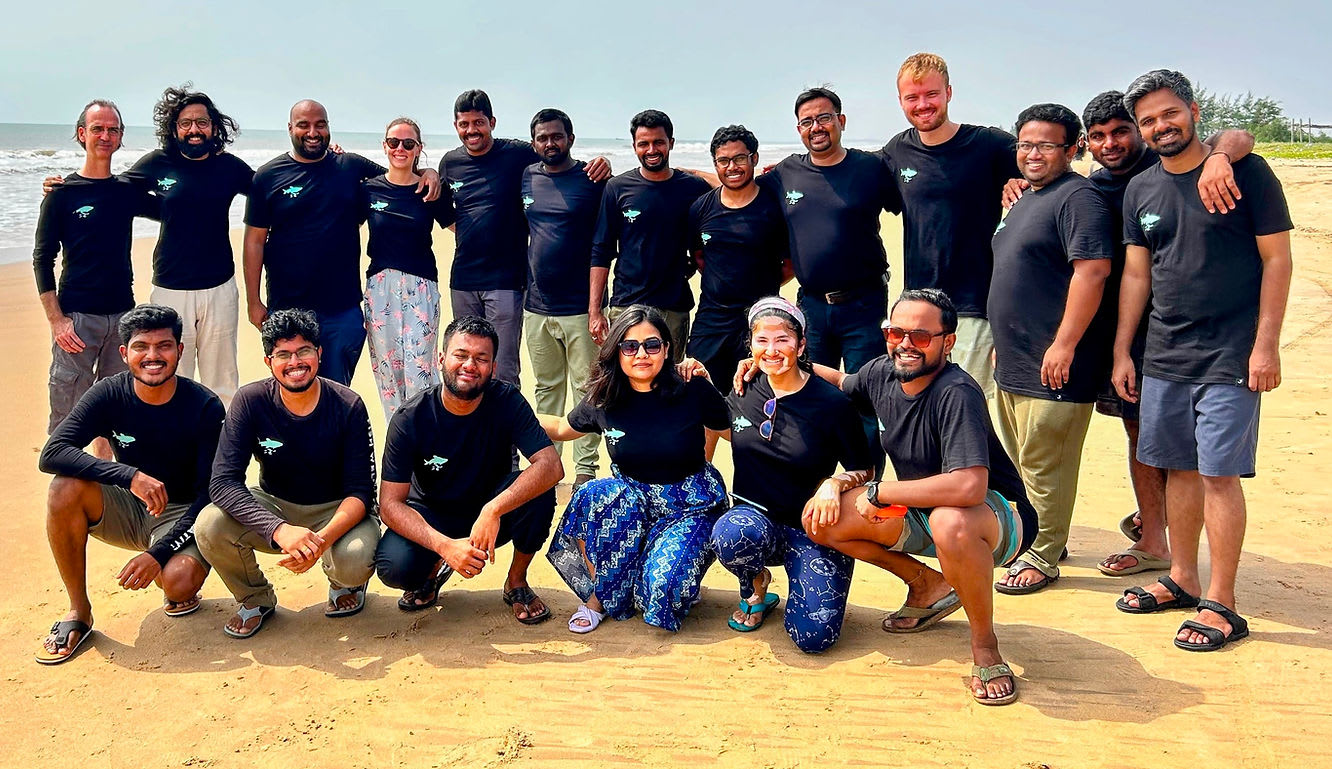
Countries of Operation
FWI operated primarily in two different countries in 2023:
- India, our primary country of implementation, about which most of this post is written. We selected India back in 2020 as our focus country, primarily because of the scale of farmed fish, the tractability we saw in our field visit of working with farmers, and our ability to hire people effectively there.
- China, where we conducted standard setting, field visits, and general early stage institutional awareness raising work. For more information on our current status in China, see our recent post.
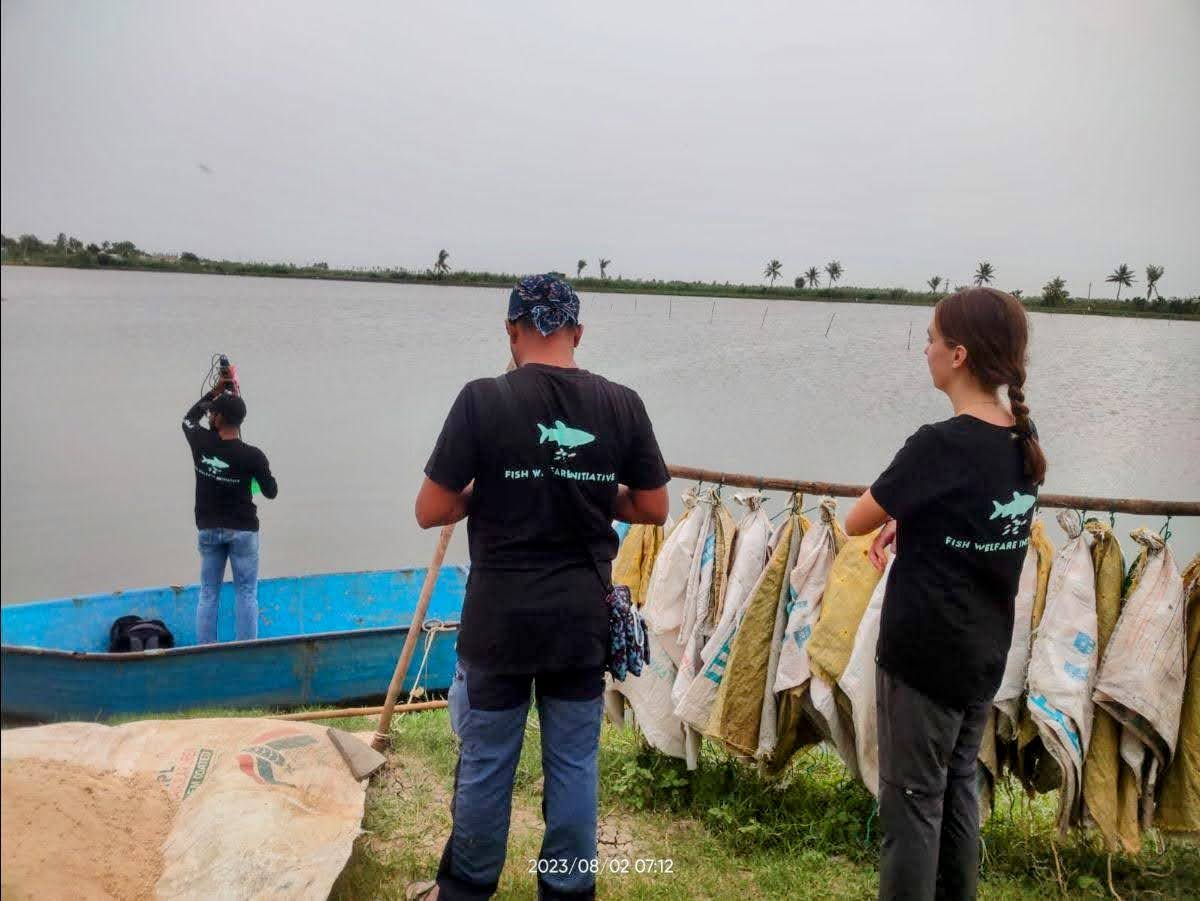
Key Outcomes
We believe the following are the key outcomes achieved by the organization in 2023:
1 - An estimated 450,000 fishes’ lives improved.
Through stocking density and water quality improvements implemented by farmers in our Alliance For Responsible Aquaculture (ARA), we estimate that we improved the lives of 450,000 fishes who would have otherwise lived in worse conditions. For more information, you can visit our impact page or see exactly how this number was calculated. On some level, we believe that all of our work boils down to this number.
2 - A new and better equipped R&D Department.
Though it’s a trend we have been following for a while, this year in particular we became aware that our current research process was not sufficient to enable us to reach the scale or cost effectiveness we have envisioned. For this reason, we revamped our process by hiring a new research lead (Dr. Paul Monaghan) and tasking him with setting a new research agenda. We also finished construction of experimental ponds at a local university (AKNU), which will enable us to test different practices in farm-like conditions, in a much more controlled environment than before, while also ensuring that no fishes are killed in the process.
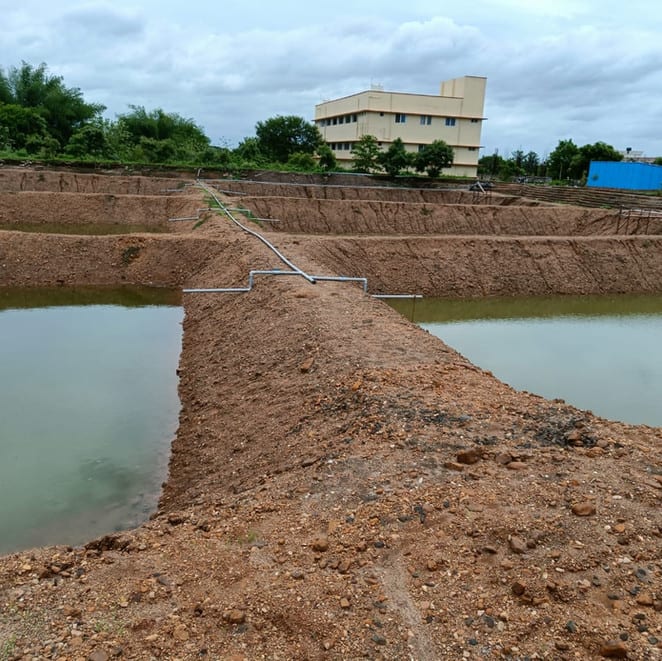
3 - A larger and more efficient farmer program.
The Alliance for Responsible Aquaculture (ARA) now has 105 active farms, 16 more farms than at the end of the previous year. It also is running more efficiently than ever before, having made a number of programmatic improvements. This program continues to be the core of our work, and our primary avenue for having an impact.
4 - Regulatory recommendations.
Last year, we submitted three regulatory recommendations to the various Indian government entities: the Central Pollution Control Board, the Animal Welfare Board of India, and the Department of Fisheries. While it is currently unclear what outcomes will result from our submissions, we do expect that they sensitize policymakers to fish welfare and the challenges with fish farming, and we hope they build FWI’s recognition as experts in the domain.
5 - Continued progress in China.
We conducted another in-country field visit, contributed to the Beijing Consensus conference to promote fish welfare, and identified priority species for whom to begin setting standards with our local Chinese partners (ICCAW). More intangibly, we believe we built many positive relationships that will be significant for advancing the field and idea of fish welfare in China over the years to come.
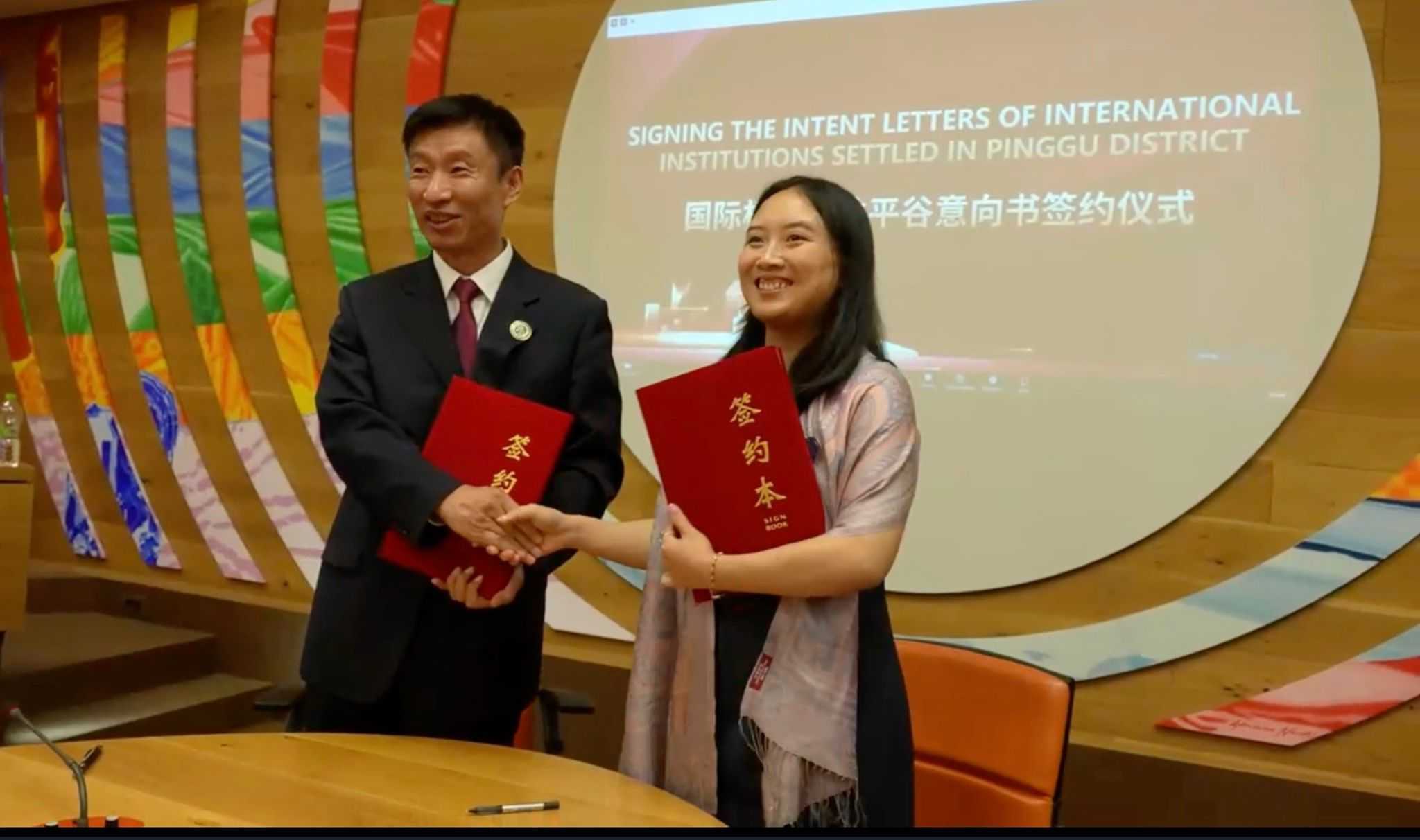
Key Challenges
Likewise, we believe the following were the organization's key challenges in 2023:
1 - We underperformed our goal for fishes’ lives improved.
One of our most important OKRs for 2023 was to improve the lives of 1.5M fishes. Unfortunately, we estimate that we only achieved about a third of that. We largely didn’t hit this goal because a) we deliberately slowed our scaling due to problems we identified in our programming; and b) we believe we were stricter at estimating fish helped in 2023 than in years prior.
We are working to address this issue both by considering more novel models in our farmer program, as well as by researching new interventions entirely with our R&D Department.
2 - We continued to face serious challenges in identifying promising welfare interventions.
Running on-the-ground tests on fish farms has been a challenge ever since we first began them in India, and 2023 unfortunately continued that trend. In particular, last year we failed to achieve our goal of validating our Version 2 Standard—largely due to poor project management and study design on the ground, compounded by the challenging conditions of rural Indian aquaculture. These challenges have also meant that we are still more uncertain than we would like to be about the magnitude of the improvements we are currently making with the ARA.
We have worked to address this issue by creating a new R&D Department with new leadership and new plans, as discussed above.
3 - Organizational instability, largely due to frequent pivots.
FWI made two pivots in 2023: One in Q1 to focus more on farmer-centric (and less on corporate and policy) work, and the other in Q4 to expand our research mandate. Both had programmatic and departmental restructuring implications, which led to significant stress and uncertainty at different points for some members of our team.
We believe we have addressed this issue, largely by investing in more likely-to-last programmatic and departmental structures now. Additionally, we believe that we have improved on our internal communications and processes for making org-wide changes, although there is still further room for progress.
4 - Internal culture and retention challenges.
In large part due to the programmatic challenges and instability discussed above, staff culture (as reported in surveys and word of mouth) as well as retention was a greater challenge in 2023.
We are now thinking much more actively about culture than previously (partially thanks to support from Sharpen Strategy), and have designated an active lead on culture (Tom, our co-founder). Culture was one aspect of the organization we didn’t deliberately attend to much when we were just a few staff members, but at 21 FTE (full-time equivalent) it seems more likely that creating a culture consistent with our values requires active attention.
Operational Notes
The following may be of interest for those interested in the more technical aspects of FWI’s operations. All budgets, OKRs, as well as some other documents may be found on our Transparency Page.
| 2023 Start | 2024 Start | 2024 Planned | |
|---|---|---|---|
| Staff Size | 21 FTE (full-time equivalent) | 20 FTE (21 as of Jan 17) | Expected ~30 FTE |
| Annual Budget | 2022: $630K, spent $500K | 2023: $670K, spent $730K | 2024: $770K |
| Animal Charity Evaluators Recommendation Status | Recommended | Rolled over from last year | We plan to re-apply. |
New staff: We were pleased to welcome the following people onto the team: Sidd (International Generalist), Mani (Field Manager), Paul (R&D Lead), Durga Prasad and Sanjay (Data Collectors), and Althy (Operations Associate). Most of these staff members are from India, while Paul is from Ireland and Althy from the Philippines.
Fundraising: The vast majority of our 2023 budget came from donors in the effective altruism and animal advocacy spaces, with about 90% coming from gifts of $10,000 or more. This included the second half of our $250,000 two-year grant from Open Philanthropy. We were also honored to have about 50 monthly donors throughout the year.
Turnover: We had higher turnover last year than usual, roughly 30% (which, for a 20-25 person organization, was significant). Turnover was both involuntary and voluntary, and was in part caused by the challenges we discussed above. The voluntary turnover in particular updated us to think that we need to be more deliberate about culture, employee relations, and internal communications. We’re now investing more in management courses and external consulting (though also mindful to avoid overly bureaucratizing).
Hiring: Hiring continued to be our biggest operational bottleneck. For instance, there were several roles for which we spent significant resources hiring for but proved unable to identify any sufficiently well-fitting candidates (e.g.). It also often proved challenging to hire ground team members in rural India who met our skill qualifications.
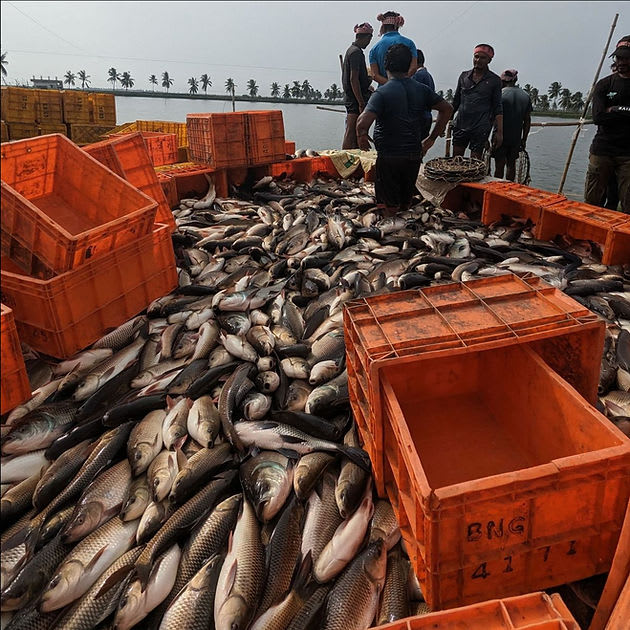
A Note of Conclusion and Gratitude
This has been the fourth full year of operations at FWI, and our third full year operating with fish farms in India, an environment still largely unexplored by the animal advocacy movement. There have been many ups and downs along the way, and we’ve learned a lot about what it means to make changes for fishes in decentralized farming systems (the reality for the majority of farmed fishes in our world). There are problems we have better figured out how to solve (e.g. water quality) and still problems that we are far from solving (e.g. slaughter via asphyxiation).
It is our hope that the foundations we laid in 2023, and the foundations we will continue laying in 2024, will bring us as well as our animal advocacy movement closer to fully addressing these welfare issues, and closer to a world that is truly humane for all.
We also wanted to thank everyone who enabled us to make the progress and the impacts we have made. In particular, that includes our donors, our advisors, and our friends and family who enable us to work for this cause. That also includes:
- People for Animals India
- Mercy for Animals India
- Shrimp Welfare Project
- Charity Entrepreneurship
- Sharpen Strategy
- Operations gurus Andrew Player and Aneeha Patwardhan
- The Charity Entrepreneurship and EA Ops Slack groups, both sources of endless wisdom and advice
Thank you all for helping us make our world a little more compassionate. We’re excited to continue sharing our progress with you.


Congrats on getting to 450k! I know you were targeting 1.5m, but 450k is nothing to sneeze at.
Thanks Ben! Yeah, I think we are often focusing more on the 1.1M we feel like we should have added to that, but definitely feels good to have had that impact still :)
Keep up the good struggle my dear fish loving friends.
Thanks Joel! And same to you—hope the research is going well
Executive summary: Fish Welfare Initiative (FWI) had a challenging 2023, falling short of key goals like helping 1.5 million additional fishes due to limitations in their interventions and organizational instability from strategic pivots. However, FWI believes they laid important foundations, like revamping their R&D department and research plans, that position them for greater impact in 2024.
Key points:
This comment was auto-generated by the EA Forum Team. Feel free to point out issues with this summary by replying to the comment, and contact us if you have feedback.